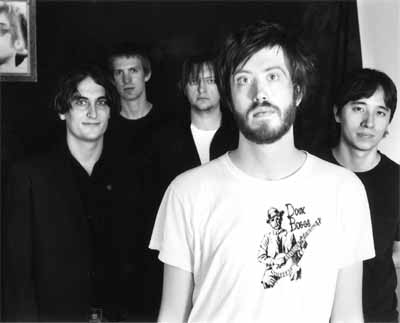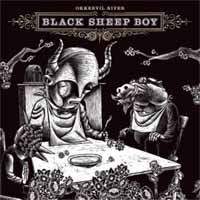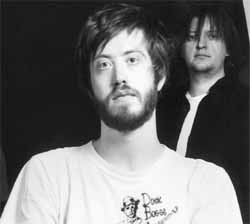|

Okkervil River: Black Sheep Boy
story by tim mcmahan
|
|
|
Lazy-i: April 6, 2005
|
How do you judge success in the world of indie rock?
"Well, we get to stay in hotels more and sleep
on floors less," said Okkervil River's Will Sheff via a van
headed to Columbia, Missouri. "You have to be happy for what
you've got; but in many ways, we're poorer than we've ever been."
This despite the fact that Okkervil River has received critical
acclaim from no less than The New York Times, wizened Rolling
Stone critic David Fricke, and most recently, the Austin
Chronicle, who featured the band in a cover story -- a long-time
goal that Sheff called "a really big deal."
"I remember back when no one would write about us, when we
were trying to figure out how to even get our CD reviewed in there."
|
|
|
The attention is justified. Since
the band's remarkable debut, Don't Fall in Love with Everyone
You See, released on respected indie label Jagjaguwar Records
in 2002, Okkervil River has developed into one of the most thoughtful
and emotionally powerful folk-rock bands on the indie circuit (and
one of my favorites). A few years after graduating from high school
in Meredith, New Hampshire, guitarist/vocalist Sheff, and former
classmates mandolin, electric/string bass player Zach Thomas and
drummer/percussionist Seth Warren formed Okkervil River in 1998
built around their mutual love for traditional American folk music
by the likes of Roscoe Holcomb, Skip James, Leadbelly, the Carter
Family, Doc Watson, and The Stanley Brothers.
Those influences and their decidedly rural, acoustic arrangements
quickly got them pegged as an "alt-country" band early
in their career. Their new CD, Black Sheep Boy, released
April 5 on Jagjaguwar, should change all that. The CD's second track,
"For Real," starts in the usual Okkervil way, with a quietly
strummed guitar and Sheff's yearning, broken voice singing, "Some
nights I thirst for real blood / For real knives / For real cries"
before exploding into pounding electric guitar chords that feel
like a hard boot to the head. The rock continues on tracks like
the poppy "Black," and the anthemic "The Latest Toughs."
But old school Okkervi fans need not fret. There's plenty of the
quieter, twangier moments on the CD as well.
Sheff acknowledged that Black Sheep Boy was a departure
of sorts, but quickly added it wasn't by design. "I have a
lot less power over that sort of thing than you think," he
said. "Playing rock music is something that we only recently
learned how to do in a way that's communicable. Our new drummer,
Travis Nelsen, and our touring guitarist, Chris Heinrich, are rock
players and understand how to do it in a way that I never did."
|

|
"Playing
rock music is something that we only recently learned how
to do in a way that's communicable."
| |
|
|

| |
"The
fact is, it's hard to spend seven months a year on the road
making less money than a 7-11 clerk and still have a satisfying
life."
| |
|
Sheff said line-up changes are one
of the realities of being a relatively unknown indie band. "When
it started, we were all really good friends from a small town of
500 with nothing to do but make our own music for fun," he
said. "The fact is, it's hard to spend seven months a year
on the road making less money than a 7-11 clerk and still have a
satisfying life. It's hard to keep a steady line-up if you can't
pay people what they're worth. We've dealt with musicians who have
families or who simply don't want to sit in a van for half the year."
When line-up changes started to become a reality, Sheff said he
"freaked out about it," afraid to break up the fellowship.
"But I learned that you can't make life the way you want it
to be," he said. "The other thing is we've changed in
positive ways that are keeping us alive creatively. It's been a
real blessing in disguise."
But after five years in a van, can the band get to the next level?
"I'm feeling hopeful that something good will happen, maybe,"
Sheff said. "On one hand, if it keeps going like this, I won't
be able to make a living off of it and will have to re-evaluate
what I'm doing. On the other hand, I'm really grateful for what
has happened. We've made a record that we wanted to make and got
it out. You can get famous and not famous. That's the way it goes.
I try to focus on how lucky we are to get to this point."
Back to

Published in The Omaha Reader April 6, 2005.
Copyright © 2005 Tim McMahan. All rights reserved.
|
|
| |
|
|
|
